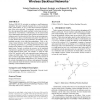Free Online Productivity Tools
i2Speak
i2Symbol
i2OCR
iTex2Img
iWeb2Print
iWeb2Shot
i2Type
iPdf2Split
iPdf2Merge
i2Bopomofo
i2Arabic
i2Style
i2Image
i2PDF
iLatex2Rtf
Sci2ools
120
click to vote
MOBICOM
2004
ACM
2004
ACM
End-to-end performance and fairness in multihop wireless backhaul networks
Wireless IEEE 802.11 networks in residences, small businesses, and public “hot spots” typically encounter the wireline access link (DSL, cable modem, T1, etc.) as the slowest and most expensive part of the end-to-end path. Consequently, network architectures have been proposed that employ multiple wireless hops in route to and from the wired Internet. Unfortunately, use of current media access and transport protocols for such systems can result in severe unfairness and even starvation for flows that are an increasing number of hops away from a wired Internet entry point. Our objective is to study fairness and end-to-end performance in multihop wireless backhaul networks via the following methodology. First, we develop a formal reference model that characterizes objectives such as removing spatial bias (i.e., providing performance that is independent of the number of wireless hops to a wire) and maximizing spatial reuse. Second, we perform an extensive set of simulation experiment...
Related Content
| Added | 30 Jun 2010 |
| Updated | 30 Jun 2010 |
| Type | Conference |
| Year | 2004 |
| Where | MOBICOM |
| Authors | Violeta Gambiroza, Bahareh Sadeghi, Edward W. Knightly |
Comments (0)

